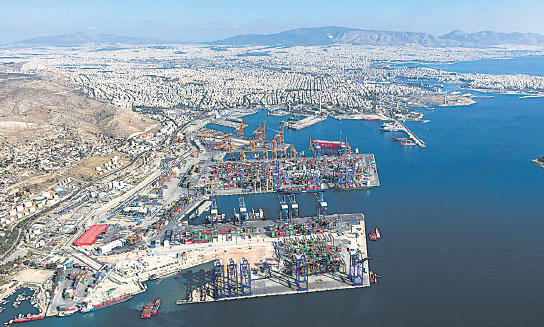Greek port grows along with Belt and Road Initiative
When President Xi Jinping and Greek Prime Minister Alexis Tsipras met in Beijing in May, the Greek city of Piraeus came up during their discussions.
According to media reports, Xi told Tsipras that the two countries should work together to build Piraeus into a container-transfer hub for the Mediterranean. Xi said he hoped to see the city become a key location for transportation and an international logistics center to support China's overland and sea links with Europe through the Belt and Road Initiative.
"The goals of the initiative are compatible with our own regional economic goals," Tsipras said in a speech at the Belt and Road Forum for International Cooperation held in Beijing on May 14 and 15.
"As a leading maritime country, we see great opportunities in the 21st Century Maritime Silk Road," he added.
Tassos Vamvakidis, for one, was happy with his prime minister's comments.
The 60-year-old, who was born and raised in Piraeus, has worked in logistics and shipping since 1973. He worked with Chinese shipping agencies while serving on the board of the International Maritime Union. Eight years ago, he began working for Piraeus Container Terminal, a local subsidiary of China Ocean Shipping Corp.
"I have had dealings with COSCO in my previous career, so I knew it well and I also got to know about China's economic growth," says Vamvakidis, the commercial manager of the company.
Vamvakidis also attended the forum as a delegate.
"I want to assist the company to transform Piraeus into a very modern and efficient port," he says. "It is my challenge and also my goal."
The port has made tremendous progress over the past eight years, he adds.
It is now the busiest port in Greece and ranks 38th in the world by volume of containers handled. In 2010, it ranked 93rd.
Vamvakidis has been both a witness and a contributor to its growth.
He joined COSCO in 2009 when Greece was grappling with its financial crisis.
At that time, there was popular outcry against government privatization plans that would cede some of the port's operations to COSCO.
People feared losing jobs, he says, adding that he saw people holding "COSCO go home" banners.
He helped convince the locals that the company was keen to make a long-term investment in Piraeus.
"Since then, we have had seven Chinese executives. All the other 1,500 employees are Greek," says Vamvakidis.
He is among the company's seven Greek executives.
In the company's office in Piraeus hangs a large painting, on one side of which stands the Acropolis in Athens and on the other side is the Great Wall of China.
"It symbolizes that, though we are different peoples, we have common goals and both have a very long history," says Vamvakidis.
Last year, COSCO sealed a $414 million deal to hold a 67 percent stake in the port.
Reuters reports COSCO will acquire 51 percent of the listed Piraeus Port Authority for $315 million and the remaining shares for $99 million after five years, once it concludes mandatory investments.
The company will pay an annual fee to the Greek state.
Han Wei, the human resources manager of the company, says it has created jobs for about 290 office workers and 1,300 port workers, and organizes reward trips for Greek employees annually.
"Last year, four outstanding Greek employees were treated with a trip to Shanghai and Beijing for a week. It will familiarize them with Chinese culture and also the company's headquarters."
COSCO says on its website that it operates about 50 ports like Piraeus worldwide and has more than 1,000 cargo ships.
xingyi@chinadaily.com.cn
|
Piraeus, a busy port in Greece, is seeking more cooperation with China's shipping companies. Photos Provided To China Daily |



















